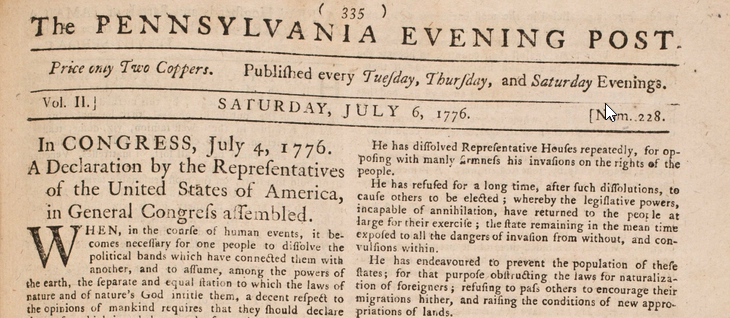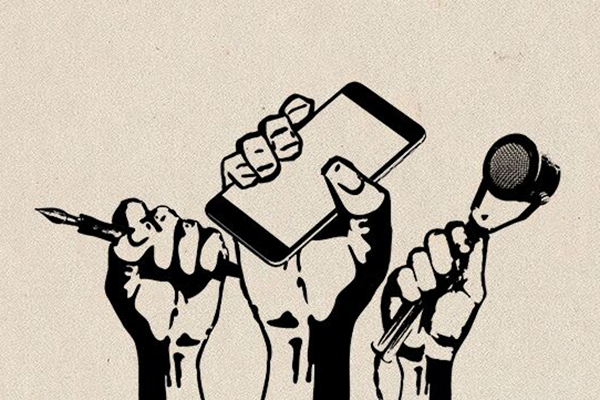Freedom Money – Bitcoin and the First Amendment
| If you find WORDS helpful, Bitcoin donations are unnecessary but appreciated. Our goal is to spread and preserve Bitcoin writings for future generations. Read more. | Make a Donation |
Freedom Money – Bitcoin and the First Amendment
By Hector Rosenkrans
Posted July 4, 2020

The Declaration of Independence was first made public in the Pennsylvania Evening Post
Living in 2020 means witnessing a revolution in our tools of communication. The last time this kind of shift happened was with the invention of the printing press, where individuals were empowered to freely communicate, share ideas, and organize with each other. The press put the power of the written word, from the Bible to the Federalist Papers, into the hands of ordinary people, and lead to both the Reformation and the American Revolution. The farmers of the Constitution understood this deeply, and enshrined these ideals atop our most important legal framework.
Freedom of the (Printing) Press
As the cornerstone to the Bill of Rights, the First Amendment lays out the core freedoms central to the idea of America. Our rights to speech, assembly, and religion are fundamental to our humanity. Recognizing this is a prerequisite to to sustain a government of the people, by the people, and for the people.
Freedom of the press is critically important as well, and it relies on technology for their realization. Freedom of speech empowers anyone to ask hard questions of their elected officials and powerful institutions, but we need technology to make their answers available to the public. Freedom of the press ensures that information can be published on a blog or in a newspaper, and broadcast over TV, radio, and streaming services.
At their core, the freedom of speech relies on the right to leverage technology to coordinate ideas and actions among individuals at scale. The printing press granted us ability to economically copy and distribute the written word at massive scale. Ideas from the Gutenberg Bible to the Common Sense were widely distributed, and could be interpreted by anyone who could read. The soft technology of the written word was turbocharged by the hard technology of mechanical innovation, and led to the revolutions that lifted the world into modernity.
Digital Speech

With the advent of the internet, we have exponentially improved on the power of the printing press. Overhead costs to reproduce ideas have again fallen to fractions of their previous levels. More importantly, instantaneous world-wide distribution of anything that can expressed on a screen went from impossible at any cost to practically free. For a brief period of time, speech was freed at global scale for anyone with access to the internet.
Unfortunately, freedom of speech that transcends borders has come at a cost. Our traditional methods for filtering quality ideas from gossip have broken down. Worse still, they have been replaced with algorithms trained to optimize for our attention at any cost. Competition for advertising revenue has driven an arms race for our time, leading to sensational headlines, click-bait, and constant ‘nudges’ from our pockets. The reason for this battle is that the world of networks, power accrues to scale, creating winner-take-all markets in information. In the wake of the Web 2.0 wars, we are left with a few large companies in nearly complete control of our tools of communication.
In the process of winning their respective networks, these companies have accrued an incredible set of data about our daily lives, enabling levels of surveillance and potential censorship unimaginable in the wildest dreams of a Stasi or SS officer. Google has recognized this growing responsibility since the early days of 2000 and 2001 when their “Don’t Be Evil” motto was introduced. Their decision to remove this language from their core message is troubling.
Overtime the risk that these tools will threaten liberty compound. Legal pressure from governments, political pressure from the mob, and economic pressure from advertisers and investors could push Facebook, Google, and others to decisions that threaten our freedoms. Today we are protected only by promises. America’s founders deeply feared the monopolist’s power, but they could not have imagined that the biggest threat to freedom would come from companies that can monopolize communications, rather than a government that monopolizes force.
A Revolution in Privacy
The Internet scaled our tools of communication over the past 30 years at an unprecedented clip and has dominated our popular understanding of computers. At the same time, another technology revolution has been quietly playing out in parallel. The development of strong public key cryptography began in secrecy in the 1970s at GHCQ, the NSA’s British cousin, and was made public in 1976.
The importance of cryptography for everyday use is increasingly clear. We can now arm ourselves with tools to protect our ideas and our data at minimal cost, exposing them only to who we chose. In the era of mass communication and mass surveillance, free expression but automated censorship, strong and open cryptography returns power to individuals. We have the ability to restore the freedoms defined in the First Amendment to their full potential, but this time in an even more connected, open, and inclusive world.
The role of Bitcoin
While public key cryptography protects our ideas and information, it doesn’t help with the content filtering problem that led to data monopolists in the first place. Markets and prices are the most effective tools for discovering value and quality, but only when the underlying money using to measure economic reality is stable and predictable.
Bitcoin solved this by creating a kind of money that operates on the same infrastructure and protocols as the internet itself, but cannot be freely printed like dollars or copied like click-bait. While technical limitations of ensuring trust in the system have prevented rapid integration at scale, steady progress is happening every day. Centuries after the invention of the printing press, we have finally found a method to store and exchange value using the same tools we use to store and exchange ideas.
Internet money will enable us to use markets to discover and filter valuable new ideas, without relying on a central authority or algorithm with its own motives. Bitcoin is fully open, ensuring the system that can be trusted by people with radically different ideas and cultures. It has the ability to serve as a common language that facilitates both trade and communication around the world.
Bitcoin offers far more than a break from the legacy financial system. It’s a protocol enabling digitally native value. For America, breaking away from England was just the first step, she had to prove to the world that she could effectively govern herself and honor her professed values. Building trust is a massive challenge that takes time and patience, most people are happy to subject themselves to the convenience of central authorities an go about their lives. But when they work, open ideas offer a blank slate build a better world.